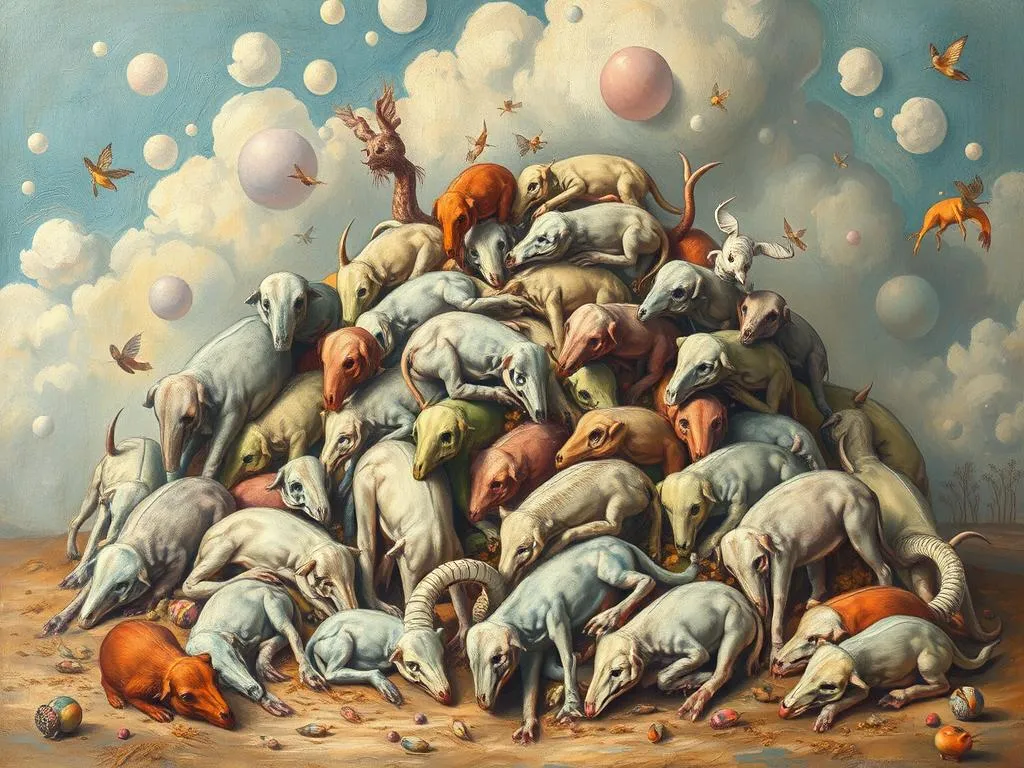
Dreams have always been a source of wonder and curiosity, serving as windows into our subconscious minds. The imagery we encounter while sleeping can evoke a range of emotions, from fear to fascination. Among the myriad of dream symbols, the pile of dead animals stands out as particularly striking and often unsettling. This dream motif raises questions about its significance and relevance in our waking lives. Why do such vivid and sometimes disturbing images inhabit our dreams? Understanding this symbolism can provide valuable insights into our emotional states, fears, and life circumstances.
Symbolism and Meaning
When interpreting a dream featuring a pile of dead animals, one must consider the varied layers of symbolism involved. Death is, of course, a primary theme, often representing the end of something—be it a phase in life, a relationship, or an aspect of one’s identity. The presence of animals can introduce additional meanings, as animals frequently symbolize our instincts, fears, or unexpressed emotions.
For instance, a pile of dead animals may symbolize feelings of loss, grief, or the need to confront uncomfortable truths. Animals, in many cultures, represent our primal instincts and the more raw aspects of our psyche. A dream featuring dead animals might suggest that certain instincts or emotions have been suppressed or neglected. Alternatively, the types of animals involved can also provide insight into the dream’s message. For example, dreaming of a pile of dead birds might signify feelings of lost freedom or creativity, while a pile of dead livestock could symbolize feelings about livelihood or productivity.
From a psychological perspective, this dream might indicate a struggle with repressed emotions. The dead animals could represent parts of your personality or life that you feel are no longer viable, prompting you to examine what needs to be acknowledged or let go. In some cases, the dream might serve as a metaphor for a relationship that has run its course, signaling the importance of moving on.
Key Scenarios and Variations
The context in which the pile of dead animals appears in a dream can dramatically influence its interpretation. Consider the scenario in which the dreamer finds themselves surrounded by a pile of dead animals. This situation may evoke feelings of overwhelm, suggesting that the dreamer feels buried under responsibilities or emotional baggage. The sheer weight of the imagery may reflect the dreamer’s current life circumstances, prompting them to assess what they might need to release to regain a sense of balance.
In another variation, if the dreamer is actively disposing of the dead animals, this could signify an effort to confront or process their feelings. It might indicate a readiness to deal with past traumas or unresolved issues, suggesting that the dreamer is on a path toward healing and personal growth. The act of cleaning up can symbolize a desire for purification and renewal, emphasizing the importance of facing difficult emotions head-on.
Alternatively, if the dreamer feels apathetic or unaffected by the sight of the dead animals, it may suggest a desensitization to certain aspects of life or an emotional detachment that could be concerning. This could be a call for introspection, urging the dreamer to reconnect with their feelings or examine why they might feel numb or indifferent.
Lastly, the presence of other individuals in the dream—such as friends or family—can also affect interpretation. If these individuals are reacting strongly to the dead animals, it may reflect the dreamer’s perception of their social circle’s emotional state or highlight interpersonal dynamics that require attention. The reactions of others can serve as a mirror, revealing what the dreamer might be avoiding in their waking life.
Real-Life Connections and Takeaways
To glean deeper insights from a dream about a pile of dead animals, it’s essential to connect the dream’s symbolism with real-life situations. Reflecting on your current emotional landscape can provide clarity. Are there aspects of your life that you feel need to be let go? Perhaps a job that no longer fulfills you or a relationship that has turned stagnant? This dream could serve as a catalyst for necessary change, encouraging you to confront what needs to be released to make room for new opportunities.
Engaging in self-reflection can help you unpack the emotions tied to this dream. Journaling your thoughts and feelings about the dream can be a powerful tool for understanding its significance. Consider questions like: What animals were present in the dream? How did you feel during and after the dream? Are there any current events or stressors in your life that resonate with the imagery of death or loss?
It’s also beneficial to adopt a mindset of curiosity rather than judgment. Dreams are complex and multifaceted, and understanding them often requires a compassionate exploration of oneself. Rather than viewing the dream as merely a disturbing image, consider it an invitation to delve into your inner world. What fears or anxieties might it be highlighting?
Additionally, taking practical steps in your waking life can aid in processing the emotions associated with this dream. Engaging in activities that promote emotional well-being, such as meditation, talking to a trusted friend, or seeking professional guidance, can help you navigate the feelings that arise. Emphasizing self-care and nurturing your emotional health can foster resilience and clarity.
In summary, dreams featuring a pile of dead animals can be both alarming and enlightening. They invite introspection and provide a unique opportunity to examine areas of life that may need attention. By interpreting the symbols and scenarios within these dreams, individuals can uncover valuable insights into their emotional landscapes and life circumstances.
Dreams are not simply random images but rather reflections of our inner worlds. Embrace the opportunity to reflect personally on this dream, and allow it to guide you toward deeper understanding and growth. Whether it’s confronting loss, acknowledging repressed emotions, or making space for new beginnings, the journey through these dreams can lead to profound personal revelations.







